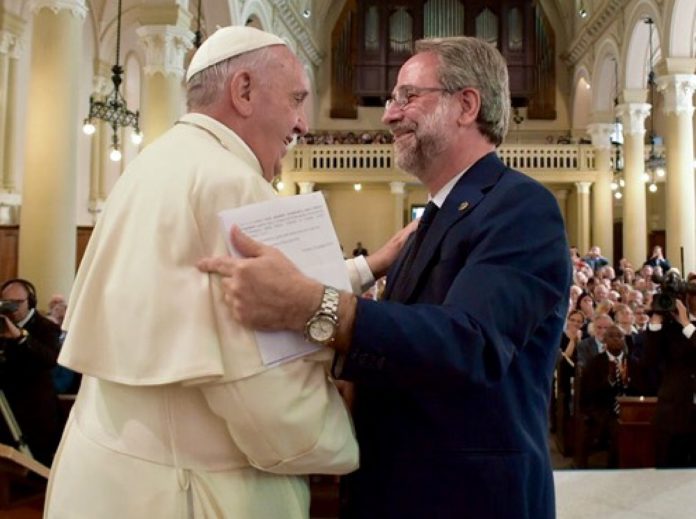
Rome (NEV), June 28, 2020 – “A historic day: so five years ago, during the same radio broadcast, I defined the event of Monday 22 June 2015 in Turin, when a pope crossed the threshold of a Waldensian temple, place of worship of a church that joined the Protestant Reformation in 1532. This church had behind it over three centuries of life and persecution, as evangelical movement centered of poverty and free preaching of the Gospel.
“On behalf of the Catholic Church – said Pope Francis in the Waldensian temple of Turin – I ask you for forgiveness for the non-Christian, even non-human, attitudes and behaviors that, in history, we have had against you. In the name of the Lord Jesus Christ, forgive us!”.
This request for forgiveness, said the then moderator of the Waldensian Board, pastor Eugenio Bernardini, “deeply touched us and we welcomed it with joy. Of course, the past cannot be changed, but there are words that at some point must be said, and the pope had the courage and sensitivity to say the right ones”.
A historic day, therefore: after five years we can certainly confirm it. Also for the fraternal frankness and the quality of the speeches that were delivered by the two sides. Particularly important, in Pope Francis’ speech, the statement that “unity which is the fruit of the Holy Spirit does not mean uniformity. The brothers are in fact united by the same origin but are not identical to each other. This is clear in the New Testament, where, although all those who shared the same faith in Jesus Christ are called brothers, it is understood that not all the Christian communities of which they were a part had the same style nor an identical internal organization. Indeed, different gifts could be seen within the same small community (see I Corinthians 12-14), and even in the proclamation of the Gospel there were differences and sometimes contrasts (see Acts 15:36-40). Unfortunately, it has happened and continues to happen that the brothers do not accept their diversity and end up waging war on each other. “With these words the pope has shown that he fully accepts an idea of ecumenism – defined as the “reconciled diversity” – which is light years away from the idea of ecumenism as the return to Rome of the “separated brothers”, which characterized the Catholic approach until a few decades ago.
Pope Francis’ visit to the Waldensian temple of Turin has opened up new horizons for ecumenical collaboration in Italy; we could mention as examples the fact that since 2016 the national ecumenical conferences of the Episcopal Conference have been organized together with Protestants and Orthodox, or the ecumenical initiative of humanitarian corridors promoted by the FCEI and the Community of St. Egidio. Of course, there is still a long way to go; but, to recall the farewell greeting on that occasion from the deacon Alessandra Trotta (who was then president of the Italian Methodist Action and today is the moderator of the Waldensian Board), it is necessary to continue walking together “with hope, to foster hope”.


























